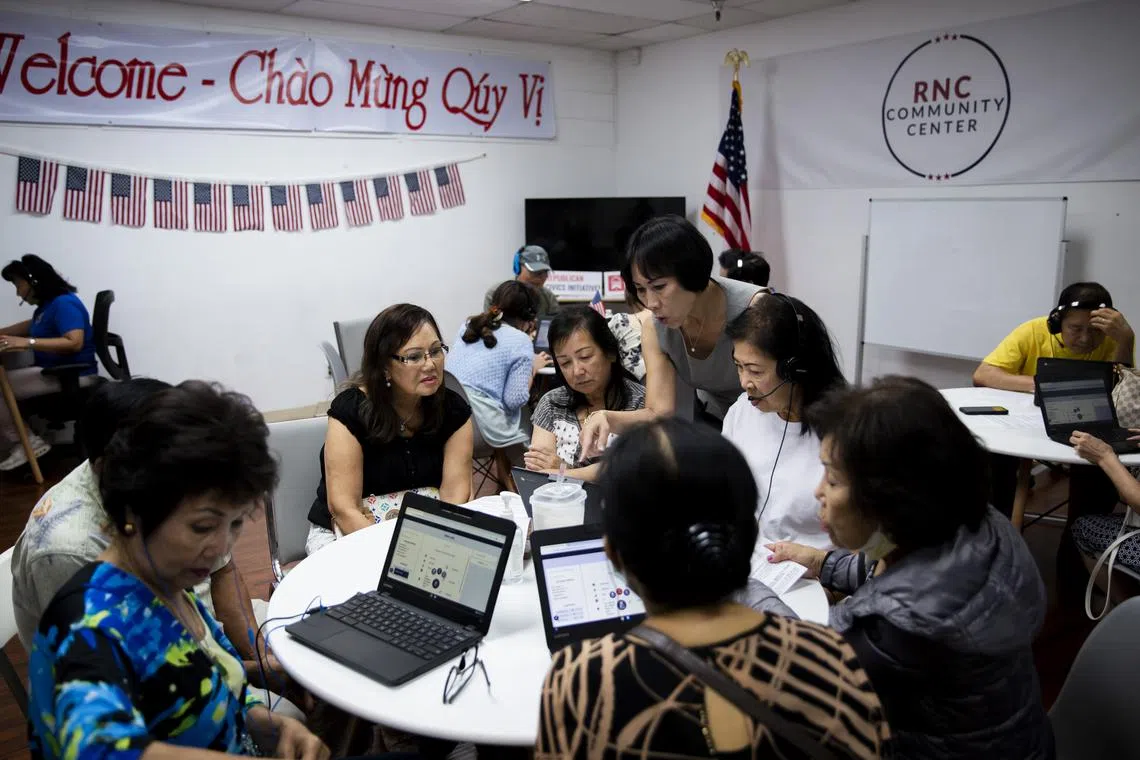Democrats and Republicans vie for Asian American voters in tight midterm elections
Sign up now: Get ST's newsletters delivered to your inbox

Volunteers making calls on behalf of Ms Michelle Steel in August. Advocates say that Asian American voters can decide elections if they turn out in large enough numbers.
PHOTO: NYTIMES
WASHINGTON - The election fliers mailed to households in Orange County, California, depicted Democratic candidate Jay Chen in front of schoolchildren with a copy of The Communist Manifesto in hand, and a sentence in Vietnamese stating that he had “invited China into our children’s classroom”.
The advertisements were from Republican incumbent Michelle Steel, a first-generation Korean American, and highlights how a rare race between two Asian Americans in next Tuesday’s midterm elections has become rife with red-baiting and racism accusations.
Mr Chen, a veteran whose parents migrated to the United States from Taiwan, fired back with his own ads referencing Mrs Steel and her husband’s links to the communist governments of Vietnam and China.
The contest is an example of the changing Asian American vote and showcases the nuances of each Asian community, as well as the potential power of the overall Asian vote in deciding whether Republicans or Democrats will control the US House and Senate.
Mrs Steel and Mr Chen are vying to represent California’s 45th district in the US House of Representatives. The highly competitive district leans slightly Republican, and is home to the third-largest Asian American population in the country.
The two candidates are among roughly 30 Asian Americans on the ballot in House and Senate elections across the US, according to a database kept by the Asian Pacific American Institute for Congressional Studies.
Mrs Steel and Mr Chen are the only Asian Americans pitted against each other, while other races have more than two candidates.
China has turned out to be a hot-button issue
But in Orange County, the Republican ads are more personal, taking aim at Mr Chen’s previous support of Chinese government-funded Confucius Institutes, language and cultural centres that subsidise Mandarin classes for students.
Most of these centres have been shut down across the US under pressure from Washington for allegedly being part of Beijing’s global propaganda campaign.
Mrs Steel’s ads have been strongly criticised, including by Asian American groups, for provoking inter-ethnic conflict, and promoting discrimination against Chinese immigrants and the belief that they are forever foreigners in America.
The Committee of 100, a non-profit group of Chinese Americans, slammed Mrs Steel for questioning Mr Chen’s patriotism.
It said in a statement last week: “These racist attacks perpetuate the harmful and inaccurate stereotypes that foment the anti-Asian hate and violence plaguing our country. It is especially harmful when these unfounded attacks come from members of our own community.”
Yet the electioneering also underscores the huge diversity and political complexity of “Asian Americans”, who make up about 7 per cent of the US population today, and can trace their roots to more than 20 countries in East, South, and South-east Asia.
Charges of communism, for example, resonate more with Vietnamese and Taiwanese American voters whose families moved to the US to escape communist governments – but who may also be weary of such smear tactics.
The fastest-growing group of voters in the US over the past two decades, Asian Americans as a whole lean Democrat and agree with the party’s stances on gun control and abortion access.
But there are differences across ethnicities – surveys show Indian Americans are more likely to vote for Democrats while Vietnamese Americans favour Republicans.
Advocates say that Asian American voters can decide elections if they turn out in large enough numbers, and grassroots organisations have been mobilising voters in swing states.
The Asian American Power Network progressive advocacy group has pumped US$10 million (S$14 million) into urging Asian Americans in Arizona, California, Georgia, Michigan, North Carolina, Nevada and Pennsylvania to vote.
The Republican National Committee has opened five Asian American community centres in California, Georgia, Nevada, Texas and Washington, as well as outreach centres for other minority groups in swing states.


